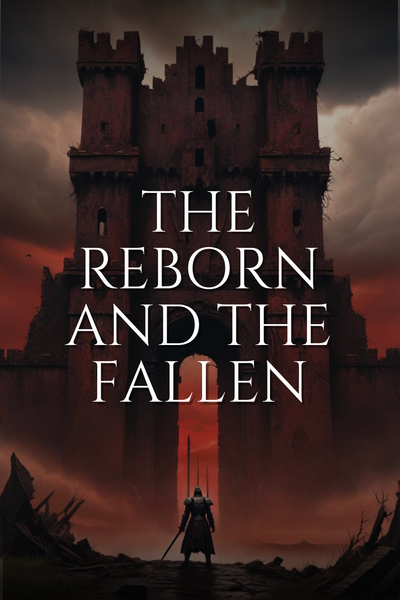The air was heavy with the scent of ash and despair as Eryth was marched toward the execution block. His newly reformed body, still trembling with the residue of his rebirth and the fresh sting of ruin, moved in measured steps along a stone corridor that had witnessed centuries of triumph and tragedy. Every footfall echoed with the voices of the damned, a relentless reminder of the legacy that now weighed upon him—a legacy of disgrace and blood, of battles fought in vain and honor long lost. The flickering torches along the walls cast wavering shadows that danced like the specters of forgotten souls, their light a feeble counterpoint to the encroaching gloom that shrouded the fortress. Here, in this ancient chamber of judgment, fate had gathered to play its final, inexorable hand.
Eryth’s mind, still struggling to reconcile the fragments of two lives merged into one, was awash in tumultuous thoughts. He had spent long hours wandering the labyrinthine corridors of the ruined fortress, grappling with the weight of his new identity and the bitter irony of his existence. In moments of silent introspection, he had come to recognize that he was not merely Kael, the relentless assassin, nor solely Eryth Vanmire, the disgraced war general condemned to live forever in infamy. Instead, he was an unholy synthesis—a creature born of ruin and rebirth, tethered by a destiny that promised neither solace nor salvation. Now, as he stood before the execution block, the grim apparatus of his fate loomed as a stark testament to the cruelty of that destiny.
The execution block itself was a grotesque monument to a time when honor was measured in blood and death was the final word. Massive stone steps led up to a raised dais, upon which a scaffold had been erected with the precision of a master craftsman, each worn rung and weathered surface bearing silent witness to the passage of countless lives. In the center of this macabre stage, the inevitable end of a condemned soul was to be met. A cold, relentless wind blew through the hall, carrying with it the murmur of ancient curses and the faint, mournful strains of a dirge sung by unseen voices. Every element of this setting conspired to emphasize the finality of the moment, as if the very fabric of time and fate had conspired to compress life’s vast narrative into this singular, devastating instant.
As Eryth was forced to ascend the steps, his heart pounded with the relentless rhythm of despair. His eyes, once sharpened by the adrenaline of combat and the certainty of purpose, now flickered with uncertainty and sorrow. The legacy of his former self—the assassin who had stalked the night with ruthless efficiency—now warred with the heavy burden of the general’s disgrace. Each step upward was both a physical and spiritual ascent into a realm where every heartbeat echoed with the inevitability of judgment. The crowd that had gathered, a motley assemblage of soldiers, courtiers, and commoners, watched with expressions ranging from cold indifference to bitter schadenfreude, their collective gaze a silent tribunal passing judgment on a man who had long ceased to exist in any form he had once known.
In that charged moment, as the chill wind whipped at his face and the torches sputtered in the darkness, the great doors at the far end of the hall creaked open with a sound that was both majestic and foreboding. The gathered assembly fell into a hushed awe, their murmurs dying away as a towering figure stepped through the threshold. It was Valtherion, the Demon Lord himself, whose very presence seemed to command the essence of both dread and reluctant reverence. Clad in obsidian armor that shimmered with an ethereal, almost malevolent radiance, he moved with a measured, regal grace that belied the tumultuous conflict that surely raged within him. His eyes, twin orbs of frozen, stormy fire, swept across the assembly and then fixed upon the solitary figure standing at the scaffold.
For a long, silent moment, time itself appeared to stand still. The air quivered with the tension of unspoken judgment, and the gathered throng seemed to hold its breath as the Demon Lord advanced. His gait was unhurried, each step measured as though he were not merely walking, but rather orchestrating the final act of a tragic opera. His features were carved in stoic lines, his expression a mask of cold authority that concealed the fierce, conflicted emotions that lay beneath the surface. In his presence, the very walls of the hall seemed to shudder with the weight of ancient power, and the faint luminescence that surrounded him lent his form an almost otherworldly quality—both terrible and majestic.
As Valtherion reached the scaffold, he halted before Eryth, who stood there with his eyes downcast, the turbulent storm of his inner life barely contained within his gaze. For an agonizing moment, the two figures regarded one another in silence—a silence that spoke volumes of the cosmic irony that had brought them together. Here stood Eryth, a man reborn in disgrace and tragedy, his soul scarred by the fires of past sins and the cold judgment of fate. And before him, Valtherion, a being of immeasurable power and eternal torment, whose dominion over life and death was absolute yet marred by a sorrow that no crown of tyranny could conceal.
At last, it was Valtherion who broke the silence, his voice resonating with a sonorous timbre that filled the chamber with both dread and a perverse beauty. “Eryth Vanmire,” he intoned, each syllable laced with the weight of ancient judgment, “your life has been naught but a tapestry of betrayal, bloodshed, and sorrow. You have walked a path paved with the shattered dreams of men and the relentless echo of your own misdeeds. Yet here you stand, a living relic of ruin, teetering on the precipice of oblivion.”
His gaze softened momentarily, betraying a flicker of something unrecognizably tender—regret, perhaps, or a longing for what might have been. “I offer you a choice,” Valtherion continued, his voice rising and falling like the tide of a dark ocean. “Serve me once more, and you shall have the opportunity to atone for the sins that have stained your soul. Embrace this path, however fraught with peril and despair it may be, and you might yet carve a fragment of redemption from the stone of your past. Or, if you choose to deny this chance, if you would rather embrace the eternal release of death, then let that be your fate—for death shall be your only solace.”











Comments (0)
See all